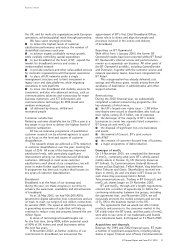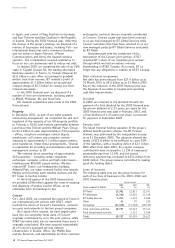BT 2003 Annual Report Download - page 20
Download and view the complete annual report
Please find page 20 of the 2003 BT annual report below. You can navigate through the pages in the report by either clicking on the pages listed below, or by using the keyword search tool below to find specific information within the annual report.Business review
BT Annual Report and Form 20-F 2003 19
residual services. The Licence also contains provisions
enabling the Director General to monitor our activities,
including requirements for BT to supply him with
information requested.
The Licence contains price control formulae, the
overall effect of which requires us to reduce, or restricts
the extent to which we can increase, the prices of many
of our telephony services to the bulk of the residential
market and also the prices for our interconnection
services, wholesale line rental services and number
portability services. In addition, the Licence contains
certain specific restrictions on the terms on which we
can trade. In particular, we are required to publish and
adhere to standard prices and other terms for providing
certain services and, in general, to apply uniformly
a published scale of charges for installing residential
exchange lines on premises to be served by a single line.
As a result of our international interests, a Licence
condition prohibits us from doing anything, by act or
omission, that would detract materially from our ability
to meet our Licence obligations to provide UK
telecommunication services and to do so to any
specified standards. BT’s directors are required to
submit an annual compliance certificate to the
Director General.
The Director General may make modifications
to a licence if the licensee does not object or the
modification is deregulatory. Alternatively, proposed
changes to the Licence may be referred by the Director
General to the Competition Commission. In either
case, the Telecommunications Act requires public
consultation before a licence can be modified. Licences
may also be modified in order to implement European
Union directives into UK law.
New European Union Directives
The provision of telecommunications networks and
services throughout the European Union was liberalised
through the implementation of a number of Directives
which came into force in January 1998. Following a
review initiated by the European Commission in 1999,
a new package of Directives for the regulation of
electronic communications continuing the EU’s policies
of liberalisation and harmonisation was adopted by
the EU in April 2002. These Directives must be
implemented in all Member States by 25 July 2003.
The new framework aims to be technologically neutral.
Individual licences will be replaced by a general
authorisation applying automatically to all providers
of electronic communications networks and services.
Member States will no longer be permitted to require
undertakings to obtain licences before operating in the
sector, though providers of electronic communications
networks and services may be required to comply with
a limited range of general conditions. Additional
obligations, legally separate from the general
conditions, will be imposed on individual providers
designated by their National Regulatory Authority
as having Universal Service Obligations or ‘‘significant
market power’’ in specified market sectors. The
‘‘significant market power’’ trigger will be aligned with
the competition law concept of dominance, and any
obligations imposed on significant market power
grounds must be the minimum required to address
identified competition problems. The new framework
requires the availability of full rights of appeal,
including appeal on the merits, against regulatory
decisions to a body with appropriate expertise. The
new Directives also incorporate mechanisms designed
to ensure consistency of regulation across the
European Union.
Oftel is currently consulting on the proposed
general conditions and Universal Service designations
and obligations. Both these aspects of the new
framework need to be in place when all existing
licences are due to cease to apply on 25 July 2003,
the implementation date for the new Directives. Oftel
is also consulting on market analyses required to
identify whether significant market power exists in
specified market areas. However, as existing significant
market power obligations can be carried forward until
the analyses are completed, this aspect of the
framework does not have to be in place by 25 July.
Significant market power obligations under the new
framework may not, therefore, be implemented until
later in 2003 and Oftel has indicated that because the
process cannot be completed before 25 July, certain
existing licence conditions relating to market areas
subject to the analyses will need to be carried over until
at least the end of August. BT can, in any event, expect
to continue to be regulated in the majority of the
markets in which it is currently regulated.
The new general conditions and Universal Service
Obligations are not expected to have a major impact
on BT, although some beneficial rationalisation of
these aspects of the framework is anticipated to result.
The introduction of the new definition of significant
market power and the requirement for market analyses
should lead to the eventual withdrawal of competition-
related regulation, relying instead on competition law
in specified market sectors which are competitive or
which become competitive in the future. In its current
market analysis consultation documents, Oftel is
proposing the removal or relaxation of such regulation
in a number of markets. Similar regulatory reviews are
underway in all EU member states which will have an
impact on the level of regulation BT, and its suppliers,
are subject to in those countries.
The Communications Data Protection Directive,
which is not part of the main Electronic Communication
Directives, was adopted in June 2002 and must come
into force in Member States by 30 October 2003.
This Directive may have cost implications for industry.
Communications Bill and Ofcom
The UK Government has completed a review of
telecommunications and broadcasting regulation. A new
regulatory body has been established, called the Office
of Communications (Ofcom), to amalgamate the roles
of the five existing regulatory agencies: the Director
General of Telecommunications; the Independent
Television Commission; the Broadcasting Standards
Commission; the Radio Authority and the
Radiocommunications Agency. Ofcom is headed by
a chairman (Lord Currie) and chief executive (Stephen
























